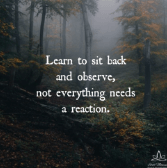Introduction
In our fast-paced world, it’s easy to get caught up in the whirlwind of daily events and feel compelled to react to everything that comes our way. But what if we learned to sit back and observe more often? What if we realized that not everything needs our immediate reaction? In this article, we’ll delve into the art of observation, why it’s important, and how it can benefit various aspects of our lives.
Understanding the Power of Observation
Definition of Observation
Observation is more than just seeing or hearing. It’s about perceiving with intent and understanding the nuances of what’s happening around us. By observing, we gather valuable information that helps us make more informed decisions.
Historical Perspectives on Observation
Throughout history, great thinkers and leaders have emphasized the importance of observation. From ancient philosophers like Socrates to modern-day scientists, the ability to observe keenly has been regarded as a crucial skill.
Why Reacting Isn’t Always Necessary
The Consequences of Overreacting
Overreacting can lead to unnecessary stress, damaged relationships, and poor decision-making. It often stems from a lack of understanding and can escalate situations unnecessarily.
Benefits of a Thoughtful Response
Taking a moment to observe before reacting allows us to process information and respond more thoughtfully. This can lead to better outcomes in both personal and professional settings.
The Psychology Behind Observation and Reaction
Cognitive Processes Involved
Our brains are wired to react quickly to stimuli, but with practice, we can train ourselves to pause and observe. This involves engaging the prefrontal cortex, the part of the brain responsible for rational thinking.
Emotional Regulation and Mindfulness
Mindfulness practices help in regulating our emotions and enhance our ability to observe. By staying present, we can manage our reactions more effectively.
Practical Techniques to Improve Observation Skills
Active Listening
Active listening involves fully concentrating, understanding, and responding to what is being said. It’s a key component of effective observation.
Mindfulness Meditation
Regular mindfulness meditation can help improve our observation skills by training our minds to focus on the present moment.
Journaling Observations
Keeping a journal of your observations can help you become more aware of patterns in your behavior and the behavior of others.
Observation in Daily Life
Personal Relationships
In personal relationships, observing rather than reacting can lead to better communication and understanding. It helps in avoiding unnecessary conflicts.
Workplace Dynamics
In the workplace, observation can help you understand the dynamics at play and navigate them more effectively. It can lead to better teamwork and productivity.
Social Media Interactions
Social media often triggers immediate reactions. Learning to observe before reacting can lead to more thoughtful and meaningful interactions online.
Benefits of Sitting Back and Observing
Enhanced Decision-Making
By observing and gathering information, you can make more informed and better decisions.
Improved Relationships
Observing others’ behavior and emotions can help improve your relationships by fostering empathy and understanding.
Increased Self-Awareness
Observation helps you become more aware of your own reactions and behaviors, leading to personal growth and development.
Challenges to Becoming a Better Observer
Overcoming Impulsiveness
It’s natural to be impulsive, but with practice, you can learn to pause and observe before reacting.
Dealing with External Pressures
External pressures can make it hard to observe and not react. Developing a strong sense of self-awareness can help you manage these pressures better.
Case Studies and Real-Life Examples
Leaders Who Exemplify Observation
Great leaders like Nelson Mandela and Mahatma Gandhi were known for their ability to observe keenly and respond thoughtfully.
Personal Stories of Transformation
Many individuals have transformed their lives by adopting a more observational approach. Their stories serve as inspiration for others.
Incorporating Observation into Your Routine
Daily Practices
Incorporating observation into your daily routine can be as simple as taking a few minutes each day to reflect on your interactions and responses.
Long-Term Strategies
Long-term strategies for improving observation include continuous learning, practicing mindfulness, and seeking feedback from others.
Mindfulness and Observation
Techniques for Staying Present
Techniques like deep breathing, body scans, and mindful walking can help you stay present and improve your observation skills.
The Role of Meditation
Meditation plays a crucial role in enhancing your ability to observe by calming your mind and increasing your focus.
Observation and Emotional Intelligence
Understanding Emotions
Observation helps you understand your own emotions and the emotions of others, which is a key aspect of emotional intelligence.
Managing Reactions
By observing your emotions, you can manage your reactions more effectively and respond in a way that is constructive and beneficial.
Conclusion
Learning to sit back and observe is a valuable skill that can improve various aspects of your life. By observing rather than reacting, you can make better decisions, improve your relationships, and increase your self-awareness. Embrace the power of observation and see the positive changes it can bring to your life.




